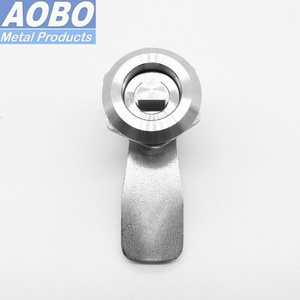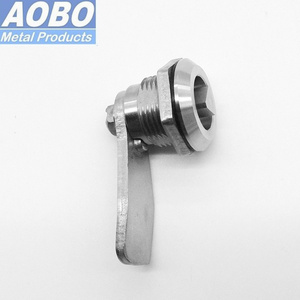(1101 products available)







































































































































































For businesses in the locksmith supplies category, having a good understanding of the different triangular key lock types is necessary for customers to choose the right lock for customers. After all, knowing the different lock types helps buyers source the right products and provides the right solutions for customers. So, when placing orders, here are the triangular key lock types to keep in mind.
These locks are designed to accept triangular keys and are mainly used in residential buildings and historical structures. The main benefit of these locks is that the triangular key adds an extra layer of security, making it harder for people to copy keys without the necessary authorization.
These locks are very popular in cabinets, small safes, and automated teller machines. Triangular keys are commonly used with these locks, especially in applications that require higher security levels. The triangular shape of the key makes it impossible for people without the correct key to operate the lock.
Triangular-key padlocks are mostly used for industrial and commercial applications. Because these keys are harder to duplicate than other key shapes, triangular key locks offer higher security than some other padlocks.
These locking mechanisms are known for their strength, and when paired with a triangular key, they offer very high security. Triangular keys help eliminate unauthorized access and provide a level of security that is vital for residential and commercial applications.
In most electronic locks, a manual backup locking mechanism is integrated for use in emergencies. Many electronic locks also feature triangular keys as a backup manual access option in case of electronic failure or depleted power supply. This allows continued security even if the electronic system fails.
The security of a lock is directly influenced by the materials with which it is made. This is why, when ordering locking systems, buyers must consider the quality of the products they purchase to meet customers' expectations. Here are the materials that make triangular key locks.
Besides these, internal components such as pins and tumblers are also important. These are often crafted from hardened steel or brass to give extra durability and wear resistance. This inside ensures adequate functionality and prevents lock picking and tampering.
Manufacturers make triangular-key lock bodies out of zinc alloy or stainless steel. Zinc alloy is commonly used due to its relatively low cost and high resistance to corrosion, which makes it suitable for interior doors or protected environments. On the other hand, stainless steel locks offer superior strength and are used in harsh outdoor environments.
The keys themselves are usually made of brass or a nickel-brass alloy. Between these two, brass is the most popular metal due to its corrosion resistance and ability to withstand wear over time. This ensures keys remain functional even after long usage. Usually, nickel-brass is chosen for its increased hardness and resistance to environmental factors, thus providing longer key life.
Manufacturers pay close attention to wear-resistant materials when making triangular-key locks because they directly influence lock's long-term performance. For instance, locks used in high-traffic areas feature materials that can withstand frequent use, such as hardened steel or ceramic inserts.
Often, triangular key locks are used in outdoor applications, meaning they need to resist rust and corrosion. Commonly, manufacturers use stainless steel, nickel-coated, or brass components to ensure the lock maintains its functionality and aesthetic appeal even in adverse weather conditions.
Businesses should know where customers plan to use their key locks. This helps in sourcing locking systems that meet customer needs and expectations. Below are the common applications of triangular key locks.
These locks are ideal for providing restricted access to sensitive areas in manufacturing plants, thus preventing unauthorized personnel from accessing crucial equipment or information. Having these locks allows factories to operate securely while keeping important areas safe.
In the construction world, these locks keep tools and equipment safe from unauthorized access or theft. They are commonly placed on job sites, and using triangular keys adds an extra security layer, protecting valuables in toolboxes or storage containers.
In retail stores or warehouses, triangular-key locks are normally used in merchandise display cases to protect valuable items. Basically, they prevent theft while allowing authorized employees to easily access stored products.
These locks are regularly deployed on utility service covers, street furniture, or outdoor electrical cabinets. This allows only authorized personnel to access important infrastructure components like control systems, wiring, or other vital utilities, ensuring that end services remain uninterrupted while also providing security. All these make them an important part of how utility companies operate and, in turn, secure their systems.
If the safe has a triangular key lock, it is often used to secure cash, confidential documents, or other high-value items. Because these locks are more difficult to replicate than standard keys, they offer an extra level of security that is desirable for personal safes and commercial-grade vaults alike.
By understanding these key factors, buyers will be able to make the necessary adjustments to their order to improve the overall business's profitability. Below are the factors that influence the price of triangular key locks.
As discussed above, manufacturers make this type of lock from various robust materials. Usually, those made from premium, corrosion-resistant materials like stainless steel and nickel-brass are more expensive than their peers. In addition, locks made from more durable materials like hardened steel also cost more, and so do those with added features like anti-picking or anti-corrosion coatings.
The more complex the lock design, the more secure it is. That said, due to the added complexity involved in making high-security locks with triangular keys, they often come at a price. For instance, locks with more pins or intricate internal mechanisms that add extra security layers will likely boost the overall cost.
Established manufacturers invest a lot in research, customer support, and production. This leads to better, more secure products with higher quality locks. Sometimes, customers are willing to pay more for a lock from a secure and reputable brand. It’s therefore important to keep in mind that the brand of choice's reputation can greatly influence the price of the locks.
During large productions, companies incur lower costs, hence the lower prices. In other words, purchasing a big volume of triangular key locks results in a significant discount per individual unit. So, if locks are ordered in bulk, negotiate for bulk deals to lower the costs.
Manufacturers may offer additional items such as backup cylinders, trim rings, or switch lever actuators that can be used with the triangular key lock. Often, these additional components are incorporated into core lock systems, driving lock costs up. Conversely, if these components are standalone, they increase the overall cost but do not influence the single lock system.
Customers always seek solutions tailored to their unique needs. A good understanding of the locking systems customers use helps buyers select the right products. Below are the important considerations to bear in mind when choosing these locks.
Consider how customers will be authorized to duplicate keys. Will the duplication require special permission? Or will it be freely accessible? Usually, triangular key locks that require a keycard or special authorization for duplication are much preferred for high-security areas. This is because they prevent unauthorized individuals from easily duplicating keys.
Triangular key locks have different locking mechanisms based on the application the lock is designed for. For instance, some look like a typical pin tumbler lock but with a triangular-shaped key that engages additional security features. To better serve customers, understand how each lock works, then use this information to guide customers needing assistance choosing the right locking systems.
These locks have unique key shapes that are extremely hard to replicate, thus providing an excellent security level. Also, some manufacturers include additional features such as key registration requirements that ensure only authorized persons have the keys. This further secures the keys and prevents unauthorized duplication, making it harder for potential intruders to access keyed areas.
In some instances, customers may operate several locks using a single key. This is particularly true in large facilities where quick access to several areas is needed. So, when sourcing these locks for the ease they provide, consider going for the compatible systems that will seamlessly work with the existing locks. Also, which key is needed for which lock should be well communicated to ensure easy lock operation.
Any industry that requires higher-than-average security typically uses these locks. Manufacturing companies, retail establishments, and utility services frequently need this type of lock to limit access to sensitive places. Likewise, construction and transportation services commonly use triangular key locks to protect vital equipment and tools from theft or unauthorized access. These are just a few industries that prefer these locks due to their unique key design and increased security level.
These locks come with various features that make them more secure. For one, many have anti-picking and anti-tampering designs. Others include tight tolerances or additional pins. Secondly, as mentioned earlier, the keys used are triangular, making unauthorized duplication very difficult. Still, some manufacturers take several extra security measures, such as key registration or restricted access to key cutting facilities. All these features combine to make triangular key locks one of the most secure options available for high-risk applications.
Often, regular maintenance like cleaning internal components and lubricating them goes a long way in keeping triangular key locks for long. This is critical, especially when the locks are used outdoors or in harsh conditions, as dust and debris often accumulate in the lock's internal mechanism. If left unattended, this buildup could interfere with the key's operation and eventually damage the locking mechanism. Another downside of neglecting maintenance is that wear and corrosion could occur, making it hard to use the key. Thus, a well-maintained lock will last longer and offer the same level of security.
Some of the most common issues include wear and tear of internal components and corrosion. As mentioned earlier, failing to maintain the lock could result in the accumulation of debris, making it hard to use. Also, if the lubricants used attract dirt, they will create a sludge that could hinder the locking mechanism.
Often, warranty types and terms vary by manufacturer and lock model. In most cases, however, warranties generally cover defects in materials and workmanship. The duration of the warranty also differs. Some are short, while others are long, like three to five years. So, ensure to check the warranty to avoid further costs when the lock malfunctions.